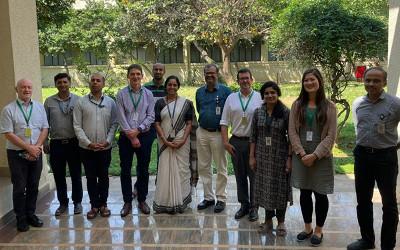£270k grant for new space X-ray technology development

Dr Chiaki Crews and her team have secured a £270,000 grant from the UK Space Agency (UKSA) for the next phase of their project aimed at using cutting-edge technology to study the X-ray aurorae. This funding will support the development and testing of the Auroral X-ray Imaging Spectrometer (AXIS), an advanced X-ray instrument set to fly on an Indian Space Research Organisation (ISRO) satellite.
Pioneering research in X-ray aeronomy
The AXIS camera project is a pioneering effort to observe and study the low-energy X-ray aurorae, a phenomenon that has not yet been thoroughly explored in this energy range. This research will enhance understanding of the Sun-Earth connection, providing invaluable data for scientists studying Earth's upper atmosphere.
This phase of the project focuses on characterizing and calibrating a novel X-ray detector from Teledyne e2v alongside an engineering model (EM) NuSCIS camera developed by XCAM. The EM camera system will be delivered to ISRO, accompanied by comprehensive training for its operation. The project partnership brings together top-tier detection expertise, scientific knowledge, and engineering capabilities, including support from University College London’s Mullard Space Science Laboratory (UCL/MSSL). The sensor technology used in the AXIS camera is groundbreaking. Unlike the conventional CCD devices used in space, which are vulnerable to radiation damage and require low operating temperatures, the CMOS technology in the AXIS camera is more robust, operates in a wider range of conditions, and consumes less power. This makes it lighter and more adaptable for space missions and various applications.
Impact
The project is not only a scientific endeavour but also a technological and economic milestone. It aims to demonstrate a new application for the X-ray detector, utilising patented technologies developed here at The Open University, showing its potential in space conditions. This could lead to future missions and other applications including X-ray spectrometers for lunar landers and in various fields such as medical physics and astronomy.
Dr Chiaki Crews, who is leading the project said, “The project strengthens UK-India collaboration, supported by the UKSA International Bilateral Fund, fostering long-term partnerships beyond this mission. Success in this phase will be marked by extensive testing and data collection on the detector, tailored to the AXIS instrument. Delivering an engineering model to ISRO, along with the necessary training, is a key aim. A successful demonstration could lead to the adoption of this technology in future space missions, further phases of funding, and the delivery of a flight detector for an ISRO-launched mission.” She also added that economically, the project promises substantial benefits. The X-ray detectors, manufactured in the UK, are high-value items that will boost the UK economy, and the camera electronics are manufactured by a UK SME.
Aligning with the goals of the Open University’s Open Societal Challenges (OSC) programme, this project highlights the importance of understanding space weather and its impact on Earth, humanity, and our infrastructure. Severe space weather is currently listed on the National Risk Register as being of significant concern, and this research will enhance our knowledge of such phenomena and could feed into strategies to improve resilience and sustainability of infrastructure.
Scheduled to conclude in March 2025, this one-year project is set to pave the way for continued development and international collaboration, marking a significant milestone in space research and technological innovation.
Contact our news team
For all out of hours enquiries, please telephone +44 (0)7901 515891
Contact detailsNews & articles

OU joins NBIC’s national biofilm research network
The Open University is proud to announce its inclusion in the National Biofilms Innovation Centre (NBIC) consortium as part of NBIC’s sixth accession round.